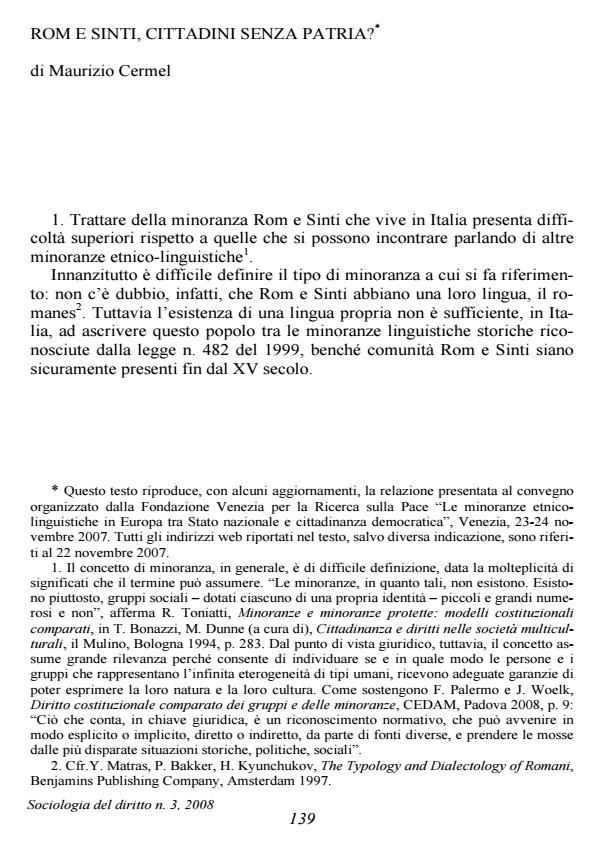Rom e Sinti, cittadini senza patria?
Titolo Rivista SOCIOLOGIA DEL DIRITTO
Autori/Curatori Maurizio Cermel
Anno di pubblicazione 2009 Fascicolo 2008/3 Lingua Italiano
Numero pagine 32 P. 139-170 Dimensione file 263 KB
DOI 10.3280/SD2008-003005
Il DOI è il codice a barre della proprietà intellettuale: per saperne di più
clicca qui
Qui sotto puoi vedere in anteprima la prima pagina di questo articolo.
Se questo articolo ti interessa, lo puoi acquistare (e scaricare in formato pdf) seguendo le facili indicazioni per acquistare il download credit. Acquista Download Credits per scaricare questo Articolo in formato PDF

FrancoAngeli è membro della Publishers International Linking Association, Inc (PILA)associazione indipendente e non profit per facilitare (attraverso i servizi tecnologici implementati da CrossRef.org) l’accesso degli studiosi ai contenuti digitali nelle pubblicazioni professionali e scientifiche
Rom and Sinti, Citizens with no Homeland? - The condition of the Rom and Sinti peoples represents very well the contradictions present in European society and the problems that Europe has to tackle if it is to pursue the path of political integration. There are several million people in the Rom and the Sinti population, distributed in small communities all over the continent. Because of their lifestyle and different language and customs, they are in practice denied access to the civil, political and social rights due to other citizens, both in Italy and in the majority of other European countries. This denial of their cultural identity sometimes verges on racial discrimination: as they lie on the margins of civil society, the authorities often treat them in ways that are incompatible with the principles of freedom, equality and solidarity on which today’s modern democracies are founded. What the institutions in the various states ought to do, on the other hand, is work together with the Rom and Sinti organisations and with the international organisations to safeguard a cultural identity that enriches Europe as a whole just as much as its national identities do, while at the same time contributing at making these people fully entitled European citizens. Eligio Resta, God and the Majority Award The history of the principle of majority is still a powerful indicator for interpreting contemporary developments in economic democracy and in political democracy. The work by F. Galgano that led to these notes illustrates a line of commentary about the form and the contents of the rule of the majority that is pursued right up to the decline perceived in the present day. Overwhelmed by the crisis afflicting the concept of representation today, the principle of the majority has come back to question us about the space reserved for deliberative democracy.;
- Citoyens ou étrangers ? Claudia Mantovan, in Déviance et Société /2012 pp.37
DOI: 10.3917/ds.361.0037 - Antiziganismo e conflitti urbani. Punti di forza e ambivalenze di un intervento di superamento dei "campi nomadi" Claudia Mantovan, in SOCIOLOGIA DEL DIRITTO 1/2016 pp.53
DOI: 10.3280/SD2016-001003
Maurizio Cermel, Rom e Sinti, cittadini senza patria? in "SOCIOLOGIA DEL DIRITTO " 3/2008, pp 139-170, DOI: 10.3280/SD2008-003005